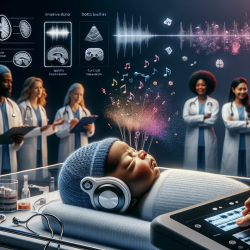Introduction
The development of auditory pathways in premature infants is a critical area of interest for speech-language pathologists and neonatal care specialists. Recent research has shed light on how auditory stimuli can evoke specific brain patterns, known as delta-brushes, in premature infants. This finding opens new avenues for assessing and enhancing early brain development.
Understanding Delta-Brushes
Delta-brushes are a unique electroencephalographic (EEG) pattern characterized by slow waves superimposed with rapid oscillations. These patterns are prevalent in the sensory cortices of premature infants and are indicative of cortical maturation. The study by Chipaux et al. (2013) explored how auditory stimuli, such as ambient sounds, can evoke these delta-brushes in the auditory cortex of premature infants.
Research Insights
The study involved 46 premature infants aged 31 to 38 postmenstrual weeks (PMW). Auditory stimuli, including low-volume clicks and human voices, were presented during EEG recordings. The findings revealed that before 35 PMW, both types of stimuli evoked cortical responses resembling delta-brushes. These responses were most pronounced in the temporal regions of the brain.
Implications for Practice
For practitioners working with premature infants, these findings suggest several practical applications:
- Assessment of Cortical Maturation: Auditory-evoked delta-brushes can serve as a marker for assessing the maturation of the auditory cortex, providing valuable insights into the developmental status of premature infants.
- Therapeutic Interventions: Incorporating auditory stimuli that mimic natural ambient sounds could potentially enhance cortical development and improve outcomes in premature infants.
- Further Research: Practitioners are encouraged to explore additional research on sensory-driven delta-brushes to better understand their role in early brain development and potential therapeutic applications.
Conclusion
The study by Chipaux et al. provides compelling evidence that auditory stimuli can evoke delta-brushes in the auditory cortex of premature infants. This research underscores the importance of sensory inputs in early cortical development and offers a promising avenue for enhancing therapeutic strategies for premature infants.
To read the original research paper, please follow this link: Auditory Stimuli Mimicking Ambient Sounds Drive Temporal “Delta-Brushes” in Premature Infants.










